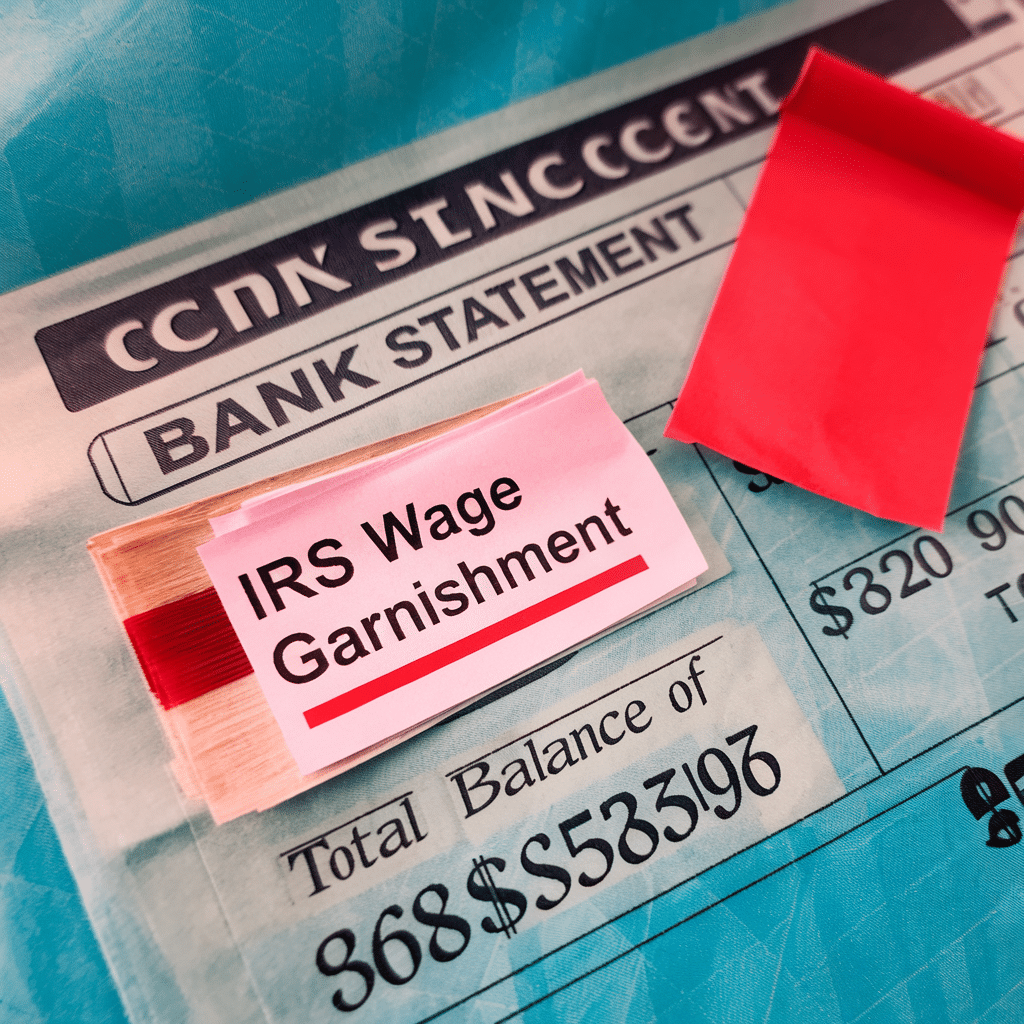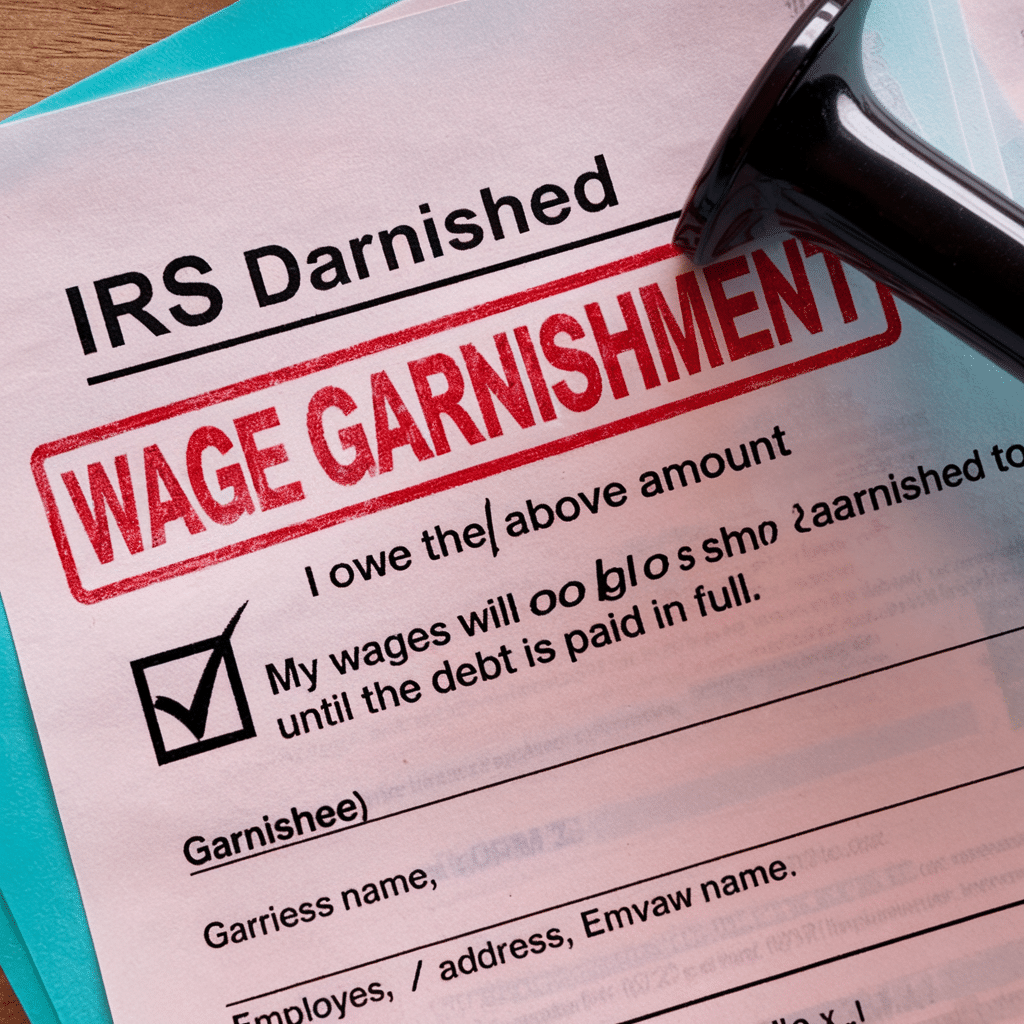
Understanding IRS Wage Garnishment: What to Expect
Facing wage garnishment by the IRS is a challenging situation for any small business owner or individual.
Garnishment of wages is a measure the IRS takes to recover unpaid taxes directly from your wages.
What causes a wage garnishment? How does IRS garnishment work? And most importantly, how can you stop an IRS wage garnishment?
This article aims to answer these questions. We’ll delve into the specifics of IRS wage garnishment, providing you with a clear understanding of the process.
We will look at ways to stop wage garnishment and protect your income while resolving your tax problems.
It is important to remember that having knowledge gives you strength and the ability to make informed decisions. Understanding information can enable you to navigate situations more effectively.
By understanding IRS wage garnishment, you can control your financial situation and navigate your way to a resolution.
Can the IRS Garnish Your Wages?
IRS wage garnishment occurs when the IRS legally takes a portion of your paycheck. This happens to collect unpaid tax debts directly from your employer.
As a small business owner, this can affect both your business and personal finances. It is not a situation to be taken lightly, as it may disrupt your operations significantly.
Wage garnishment can serve as a crucial indicator. It often reflects deeper issues, such as unfiled returns or unmanaged tax debts. When other IRS debt collection attempts have failed, the IRS resorts to this as a final measure.
The garnishment process ensures they receive owed taxes, protecting public revenue. It’s a direct impact on your cash flow, making it vital to act quickly and decisively.
Understanding wage garnishment is crucial for navigating IRS communications effectively. Preparing ahead with detailed knowledge can help prevent reaching this critical point.

IRS Garnishment
The IRS garnishment process is methodical, beginning with several attempts to resolve the debt. First, you will receive notices from the IRS about your outstanding tax liability. These notices should not be ignored; each one escalates in urgency.
Once initial warnings are overlooked, you may receive a Notice of Intent to Levy. This notice is a clear indication the IRS intends to move forward with garnishment. At this stage, you still have opportunities to resolve the situation before it reaches your wages.
The steps typically involve:
- Receiving IRS notices: Demand for payment.
- Issuance of a Final Notice of Intent to Levy.
- A waiting period of 30 days before garnishment starts.
Acting promptly during these steps can help prevent garnishment. It’s essential to communicate with the IRS or seek professional guidance. Understanding each phase equips you with the necessary information to make informed decisions.
Keep in mind, the IRS seeks to collect taxes that are due. They prefer resolution without garnishing wages, so seize the opportunity to work with them.
Receiving a CP504 Notice
The CP504 notice is a critical warning from the IRS. It notifies you of a balance due and impending collection actions. This includes the possibility of wage garnishment if the debt remains unpaid.
Ignoring a CP504 notice can lead to further penalties. Responding quickly is crucial to prevent the escalation of the situation.
You must either pay the amount due or arrange a payment plan. Timely action can significantly reduce stress and financial strain.
Criteria for IRS Wage Garnishment
The IRS uses specific criteria to initiate wage garnishment. Primarily, it targets taxpayers with significant unpaid tax liabilities. Repeated failure to respond to IRS notices often triggers this action.
Other factors include unfiled tax returns and incomplete responses to IRS communication. The agency ensures fair warning and numerous chances to resolve the debt.
If these opportunities are ignored, garnishment proceedings may follow. It’s critical to be proactive and manage tax obligations diligently.
How Much Can the IRS Garnish from Your Wages?
The IRS determines garnishment amounts based on your financial situation. There are legal limits to how much they can take, protecting you from undue hardship. Typically, they leave you with a basic living allowance.
The amount varies depending on filing status and exemptions claimed. This ensures your essential expenses are still covered during the garnishment period.
Understanding these limits helps in planning and budgeting accordingly. Remember, garnishment continues until the debt is settled or arrangements are made.
To stop garnishment, consider negotiating a payment plan or exploring other relief options. Seek professional help if necessary to ensure the best approach based on your circumstances.
How to Respond to a Wage Garnishment Notice
Receiving a wage garnishment notice can be alarming. However, your response can make a significant difference. Quick and deliberate actions may prevent deeper financial troubles.
First, thoroughly read the notice to understand the specifics of your tax debt. This includes the amount owed and the timeline for resolution. Identifying these details enables you to evaluate your available options.
Consider the following steps to respond effectively:
- Contact the IRS to discuss your situation.
- Seek a professional tax advisor for guidance.
- Assess your finances to determine payment capabilities.
- Explore options such as payment plans or offers in compromise.
Taking these steps can help halt garnishment and resolve tax debt. Each case is unique, so tailoring your approach to your circumstances is essential. Immediate action demonstrates your willingness to resolve the issue, positively impacting IRS negotiations.

Filing Unfiled Tax Returns
Unfiled tax returns can lead to wage garnishment. Filing them is essential to showing compliance and rectifying your standing with the IRS. This step can lower your anxiety and clarify how much you owe.
Begin by gathering your financial documents. Ensure all required forms and supporting details are accurate and complete. Addressing past-due returns improves negotiations with the IRS.
Filing outstanding returns could also make you eligible for relief programs.
If you can’t pay the full amount, filing on time can lower penalties and show you want to fix the problem.
Addressing Cash Flow Issues
Cash flow issues often contribute to tax problems. Addressing these issues is crucial to stop wage garnishment and restore financial stability. Review your financial habits to find any areas that could be improved.
Begin by analyzing your income and expenditures. Recognizing patterns helps in making informed financial decisions. Next, look into methods for reducing unnecessary expenses.
Consider implementing a strict budget to manage resources better. Seek advice from a financial planner if needed. Efficient cash flow management ensures you can meet both regular expenses and tax obligations.
Strategies to Stop IRS Wage Garnishment
Stopping IRS wage garnishment demands strategic action. The key is to act swiftly and choose the right approach. Each strategy can be customized to fit your financial situation.
Setting up a clear plan with the IRS can halt wage garnishment. Proving your commitment to addressing the debt reinforces your position. Numerous options are available for those willing to negotiate.
Consider the following strategies to address wage garnishment:
- Request a payment plan to spread debt over manageable installments.
- Explore an offer in compromise to settle debts for less.
- File any past-due tax returns promptly to avoid future penalties.
- Engage a tax professional for personalized advice and negotiation support.
These actions can ease the pressure and improve financial stability. By working with the IRS, you can keep more earnings and shift focus to sustainable financial health. With informed decisions, wage garnishment can become a temporary setback rather than a lasting burden.
Setting Up IRS Payment Plans
IRS payment plans can be a lifeline for those facing IRS garnishments. It allows for structured, manageable repayments. This approach shows the IRS your intent to resolve the debt.
To initiate a plan, contact the IRS immediately. Provide detailed information about your financial status. This will help establish a realistic schedule.
Keep in mind that making payments on time is essential.
Sticking to the agreed terms prevents additional garnishments and keeps your finances on track.
Offer in Compromise: Settling for Less
An Offer in Compromise (OIC) can help you settle your tax debt. It allows you to pay less than the full amount owed. This solution is suitable for those experiencing financial hardships.
Qualifying for an OIC requires meeting certain criteria. Submitting a proposal includes thorough financial assessment by the IRS. They will evaluate your ability to pay based on income and expenses.
If approved, an OIC can significantly relieve your debt burden. This option not only reduces your obligations but also prevents future garnishments.
Seeking Professional Tax Advice
Engaging a tax professional is often crucial when confronting wage garnishment. These experts offer tailored strategies, addressing your unique financial situation. They navigate complex tax laws that are challenging for individuals.
A tax advisor can represent you in discussions with the IRS. Their expertise may uncover options you weren’t aware of. This guidance streamlines the resolution process.
Choosing professional help provides peace of mind. It ensures errors are minimized and the best possible outcome is achieved. With their support, moving past wage garnishment becomes a clear and achievable goal.
Navigating Complex Tax Issues
Handling complex tax issues requires a proactive approach and a sound strategy. Navigating these waters requires small business owners to understand intricate tax codes and regulations. Missteps in tax filings or payments can lead to severe consequences like garnishments or liens.
To stay ahead, it’s vital to maintain thorough and organized financial records. This practice aids in accurate reporting and can prevent many common mistakes. Additionally, regular reviews with a tax professional can ensure compliance and catch errors early.
Understanding your obligations as an employer, such as payroll taxes, can save you from unexpected penalties. Fulfilling these responsibilities accurately will keep the IRS at bay.
Taking charge of your finances will help protect your cash flow and support your business’s growth and stability.
Dealing with Payroll Tax and Liens
Unpaid payroll taxes can be crippling for businesses. The IRS takes these violations seriously, often imposing liens on business assets. This action restricts access to capital and can hinder operations.
To resolve issues with payroll taxes, accurate and timely payments are essential. If debts accumulate, communicating with the IRS promptly can prevent escalation. They may offer options like installment agreements to ease the burden.
Seeking expert advice on payroll processes can prevent future problems. Proper setup and regular audits of payroll accounts minimize risks and safeguard your business.
Surviving an IRS Audit
An IRS audit can be daunting, but preparation makes it manageable. Understanding the audit process and gathering comprehensive documentation are crucial steps. These audits examine past tax returns for accuracy and compliance.
Maintaining detailed records of income, expenses, and deductions is imperative. These documents substantiate your claims and simplify the auditing process. Whenever possible, respond to IRS requests promptly to demonstrate compliance.
During an audit, having a tax professional can be advantageous. They represent your interests, ensuring fair treatment and reducing stress. With the right approach, an audit can be navigated successfully without severe financial repercussions.
Personal Finances and IRS Garnishment
IRS wage garnishment can disrupt personal financial stability. When your wages are garnished, it reduces the cash available for personal expenses. This can lead to challenges in meeting day-to-day obligations.
Understanding how wage garnishment affects personal finances is crucial. Planning ahead and adjusting your budget can help mitigate these impacts. This situation emphasizes the importance of resolving tax debts promptly.
Taking control of personal financial health amidst garnishment requires strategic planning. Addressing the root causes of tax debt through professional guidance can lead to long-term stability. Your ultimate goal should be to regain control and prevent future garnishments.
Divorce and Shared Tax Liability
Divorce complicates tax matters, especially with joint liabilities. Unpaid taxes from a marriage may leave you responsible for debts you didn’t incur. The IRS expects payment, regardless of divorce proceedings.
Addressing shared tax liabilities quickly is vital. Communicate with your ex-spouse if possible, and consider legal avenues for resolution. Filing for Innocent Spouse Relief might offer protection if you qualify.
Clear separation of liabilities is also crucial post-divorce. Consulting a tax advisor can provide insights into managing joint obligations and ensuring compliance. This step is essential for preventing future financial entanglements with the IRS.
Separating Personal and Business Finances
For business owners, mixing personal and business finances leads to complications. Clearly defined financial boundaries protect your personal assets and simplify tax reporting. Establishing these boundaries should be a priority for any entrepreneur.
Using separate accounts for business transactions creates transparency. It aids in accurate bookkeeping and prepares you for efficient tax filings. This distinction can also prevent IRS complications linked to your business.
Separating finances also safeguards personal credit from business risks. With well-defined financial practices, you can focus on business growth without jeopardizing personal security. Engaging with a financial advisor can guide you in setting up these robust systems.
Conclusion: Taking Timely Action
Facing IRS wage garnishment can be daunting, but action is your best ally. Proactively addressing tax issues is essential to preventing and resolving garnishment.
Responding sooner gives you more choices.
Engaging with the IRS promptly can halt further collections. Whether you’re negotiating a payment plan or filing unfiled returns, timely action is crucial. Ignoring notices only exacerbates financial strain and limits your choices.
Ultimately, seeking professional help ensures informed decisions. A tax expert can guide you through complex scenarios and suggest tailored strategies. Taking control now paves the way for financial stability and peace of mind.